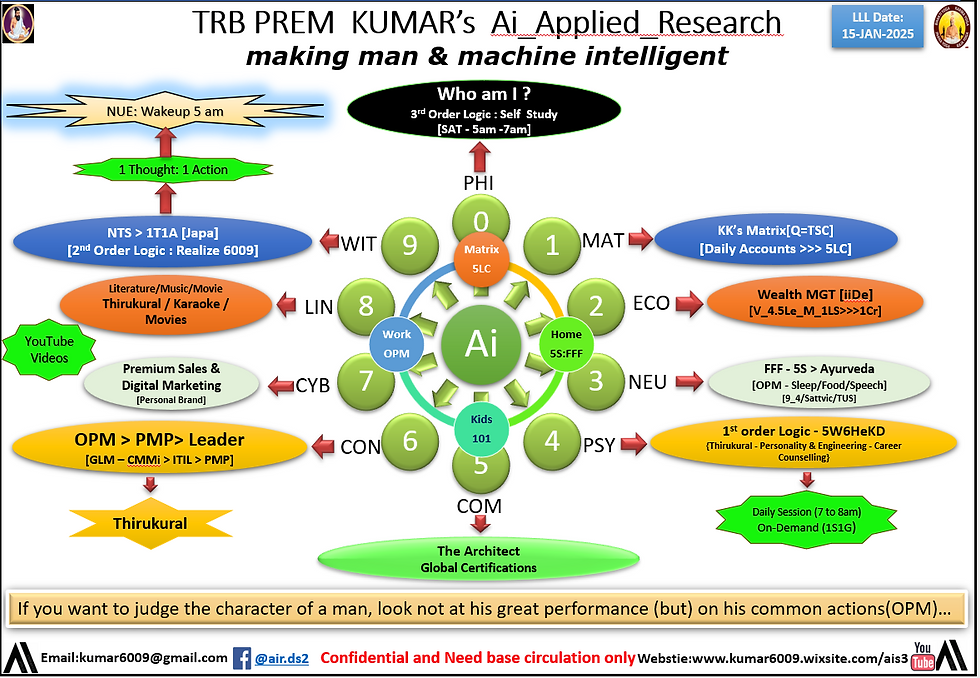What are 10 domains of AI R&D?
- T R B PREM KUMAR

- Jul 20, 2025
- 3 min read
Hi Friends,
Before starting to discuss the 10 domains of AI R&D, let's first understand the purpose of AI R&D.
Purpose: making man & machine intelligent
What are the 10 domains?
Philosophy
Mathematics
Economics
Neuroscience
Psychology
Computer Engineering
Control Theory
Cybernetics
Linguistics
Witness
Brief Intro in the 10 Domains:
00 Philosophy
What: Faith in self and finding the answer for "Whoami?"
Goal : Being and Becoming of "Truth / Existence + Pure Love /Knowledge / Consiciousness + Eternal Happiness"
Daily Practice: 4 Paths (Paths are Different, but the goal is the same.)
Path of Duty, i.e., Karma Yoga / Sariyai
Daily Actions - OPM - Common Actions
Special Actions - Su-Dharma
Bad Actions - Ku-Dharma - Cause for Pain & Problems
Solution Actions - Actions that remove from Samsara
Whirlpool of Birth & Death of Ego (I), i.e., Dhasa Margam
Do your duty with 100% Concentration and perfection without thinking about the personal results, i.e., Name, Fame, ...
*** If your actions are not directed towards fulfilling your duty, i.e., Righteousness, Wealth, happiness, and freedom, then you are on the path of blame-mode, torturing yourself and your surroundings. In Vice-versa, if your actions are making you happy and your surroundings, then you are in Learning-mode, and GOD will come as a human and help those who help themselves. That's all
Path of Love, i.e., Bhakti Yoga / Kiriyai
Apara-Bhakti i.e. Kid
Desire to have this and that, i.e, Love Yourself
Ask GOD like a kid is asking his parents, i.e., Sat-Puttra Margam
Para/Prema Bhakti, i.e., Parent-Universal Love - Fatherhood /Motherhood
Knowing and starting a relationship with GOD
Working with and for GOD
Surrender all desire, i.e., Thoughts - No Thought state - No Ego (I)
Monkey Style - Put your effort and result leave to GOD
Cat Style - No Effort, GOD will take and wherever and whatever
Path of Self-Displince, i.e., Raja Yoga / Yogam ( 8 Limbs /Steps)
Karma Yoga (Choice is yours)
Yama - Don'ts
No Mobile browsing
No Night work
No Non-Veg (If possible)
No Angry / Sadness / Revenge
Niyama - Dos
Awake at 5 am
Eat what is needed for the body, i.e., Eat to Live
The world is a Mixture of Good & Bad - But Think Good
Speak TUS, i.e. Truthful > Useful > Sweetful
"This life is short, the vanities of the world are transient, but they alone live who live for others, the rest are more dead than alive. - Swami Vivekananda
Bhakti Yoga
3. Asana - Guesters & Postures - Flexible Body - Fit for Meditation
4. PranaYama - Breath Control, i.e., Be Positive
5. Pratham-Hara - Withdrawal of the 5 Senses
Raja Yoga
6. Dharna - Concentration - 1 Thought - 1 Action
7. Dhiyana - Meditation - Witness your Thoughts effortlessly
8. Samadhi - Union/Absorption
A state of deep absorption and union with the object of meditation, experiencing a sense of oneness and transcendence.
Being & Becoming - No Thought State ( No "I" Thought, i.e. Ego)
Path of Self-Knowledge, i.e,. Jnanam Yoga / Jnanam
Viveka (Discrimination): The ability to differentiate between the eternal and the fleeting, according to the Fitsri Yoga.
Vairagya (Detachment): Cultivating dispassion towards worldly pleasures and ego-driven desires.
Shatsampat (Six Virtues): Six mental practices – shama (calmness), dama (restraint), uparati (renunciation of unnecessary activities), titiksha (endurance), shraddha (faith), and samadhana (concentration) – to stabilize the mind and emotions.
Mumukshutva (Longing for Liberation): An intense and unwavering desire for liberation from suffering.
Core practices
Sravana (Hearing): Systematically studying and listening to sacred texts like the Upanishads and Bhagavad Gita, often with the guidance of a guru (teacher).
Manana (Reflection): Deeply contemplating the teachings, analyzing and questioning them, and clarifying doubts.
Nididhyasana (Meditation/Assimilation): Engaging in meditation or self-inquiry, internalizing the knowledge gained, and experiencing the truth directly.
01 Mathematics
02 Economics
03 NeuroScience
04 Psychology
05 Computer Engineering
06 Control Theory
07 Cybernetics
08 Linguistics
09 Witness
AI - Applied Research - Roles and Responsibilities



Comments